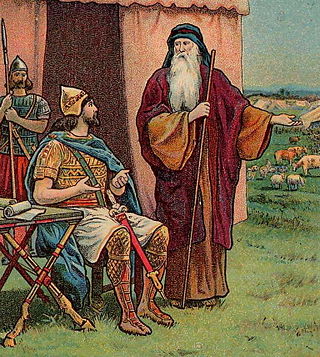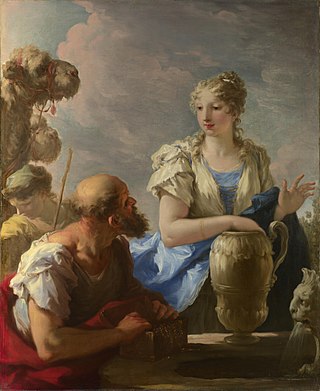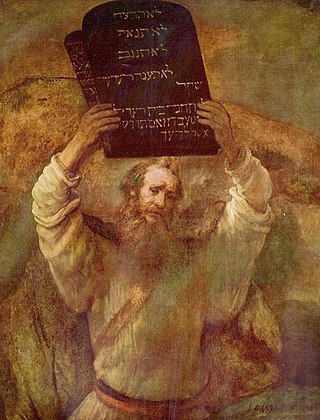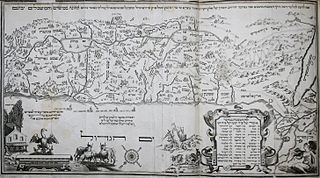This article relies largely or entirely on a single source .(January 2021) |
Alammelech is a Biblical place described in the Book of Joshua. It lies within Tribe of Asher land, between Achshaph and Amad. [1]
This article relies largely or entirely on a single source .(January 2021) |
Alammelech is a Biblical place described in the Book of Joshua. It lies within Tribe of Asher land, between Achshaph and Amad. [1]

Samuel is a figure who, in the narratives of the Hebrew Bible, plays a key role in the transition from the biblical judges to the United Kingdom of Israel under Saul, and again in the monarchy's transition from Saul to David. He is venerated as a prophet in Judaism, Christianity, and Islam. In addition to his role in the Bible, Samuel is mentioned in Jewish rabbinical literature, in the Christian New Testament, and in the second chapter of the Quran. He is also treated in the fifth through seventh books of Antiquities of the Jews, written by the Jewish scholar Josephus in the first century. He is first called "the Seer" in 1 Samuel 9:9.

In the Book of Genesis, Dinah was the seventh child and only daughter of Leah and Jacob. The episode of her violation by Shechem, son of a Canaanite or Hivite prince, and the subsequent vengeance of her brothers Simeon and Levi, commonly referred to as the rape of Dinah, is told in Genesis 34.

Gerar was a Philistine town and district in what is today south central Israel, mentioned in the Book of Genesis and in the Second Book of Chronicles of the Hebrew Bible.
The genealogies of Genesis provide the framework around which the Book of Genesis is structured. Beginning with Adam, genealogical material in Genesis 4, 5, 10, 11, 22, 25, 29–30, 35–36, and 46 moves the narrative forward from the creation to the beginnings of the Israelites' existence as a people.

Deuteronomistic history of the Hebrew Bible describes a United Monarchy or United Kingdom of Israel existing under the reigns of Saul, David, and Solomon, encompassing the territories of both the later kingdoms of Judah and Israel.
In the Acts of the Apostles, Joseph Barsabbas was one of two candidates qualified to be chosen for the office of apostle after Judas Iscariot lost his apostleship when he betrayed Jesus and committed suicide. After the casting of lots he was not chosen, the lot instead favoring Matthias to be numbered with the remaining eleven apostles.

Salkhad is a Syrian city in the As-Suwayda Governorate, southern Syria. It is the capital of Salkhad District, one of the governorate's three districts. It has a population of 15,000 inhabitants.

Almah, from a root implying the vigour of puberty, is a Hebrew word meaning a young woman ripe for marriage; despite its importance to the account of the virgin birth of Jesus in the Gospel of Matthew, scholars agree that it refers to a woman of childbearing age and has nothing to do with virginity. It occurs nine times in the Hebrew Bible and in every usage the word is either used for a woman who is indicated to be a virgin or as indeterminate.

Mount Horeb is the mountain at which the Ten Commandments were given to Moses by God, according to the Book of Deuteronomy in the Hebrew Bible. It is described in two places as הַר הָאֱלֹהִים the "Mountain of Elohim". The mountain is also called the Mountain of YHWH.

Neot Kedumim, the Biblical Landscape Reserve in Israel is a Biblical garden and nature preserve located near Modi'in, midway between Jerusalem and Tel Aviv, Israel.
Nephesh is a Biblical Hebrew word which occurs in the Hebrew Bible. The word refers to the aspects of sentience, and human beings and other animals are both described as being nephesh. Bugs and plants, as examples of live organisms, are not referred in the Bible as being nephesh. The primary meaning of the term נפש is 'the breath of life' instinct in the nostrils of all living beings, and by extension 'life', 'person' or 'very self'. There is no term in English corresponding to nephesh, and the (Christian) 'soul', which has quite different connotations is nonetheless customarily used to translate it. One view is that nephesh relates to sentient being without the idea of life and that, rather than having a nephesh, a sentient creation of God is a nephesh. In Genesis 2:7, the text is not that Adam was given a nephesh but that Adam "became a living nephesh." Nephesh when put with another word can detail aspects related to the concept of nephesh; with רוּחַ rûach it describes a part of mankind that is immaterial, like one's mind, emotions, will, intellect, personality, and conscience, as in Job 7:11.

Rhoda is a woman mentioned once in the New Testament. She appears only in Acts 12:12–15. Rhoda was the first person to hear Peter after God freed him from prison, but no one believed her account that Peter was at the door because they knew he had been put in prison and couldn't believe that he had actually been freed.
According to 1 Kings 20:1–34 and 2 Kings 6:8–7:16, the Israelite–Aramean War was an armed conflict between the Israelites and the Arameans and Amorites that took place in the Levantine regions of Aram and Bashan. It is generally considered to have taken place around the year 874 BCE. The war resulted in a victory for the Israelites and saw the Kingdom of Israel conquer the Biblical city of Golan, a vital landmark that is widely believed to have historically stood on the site of the village of Saham al-Jawlan in modern-day Syria.
The Pulpit Commentary is a homiletic commentary on the Bible created during the nineteenth century under the direction of Rev. Joseph S. Exell and Henry Donald Maurice Spence-Jones. It consists of 23 volumes with 22,000 pages and 95,000 entries, and was written over a 30-year period with 100 contributors.
The Hebrew Bible contains a number of references to rape and other forms of sexual violence, both in the Law of Moses, its historical narratives and its prophetic poetry.
Isaiah 49 is the forty-ninth chapter of the Book of Isaiah in the Hebrew Bible or the Old Testament of the Christian Bible. This book contains the prophecies attributed to the prophet Isaiah, and is one of the Books of the Prophets. Chapters 40-55 are known as "Deutero-Isaiah" and date from the time of the Israelites' exile in Babylon. This chapter includes the second of the songs of the "Suffering Servant".

Numbers 31 is the 31st chapter of the Book of Numbers, the fourth book of the Pentateuch (Torah), the central part of the Hebrew Bible, a sacred text in Judaism and Christianity. Scholars such as Israel Knohl and Dennis T. Olson name this chapter the War against the Midianites.

According to the Hebrew Bible, the Tribe of Asher was one of the Tribes of Israel descended from Asher, the eighth son of Jacob. It is one of the ten lost tribes.